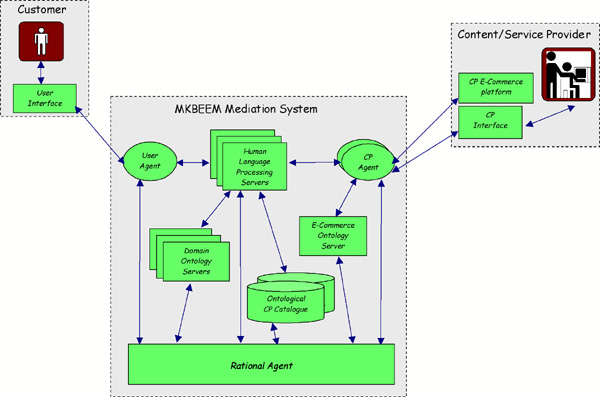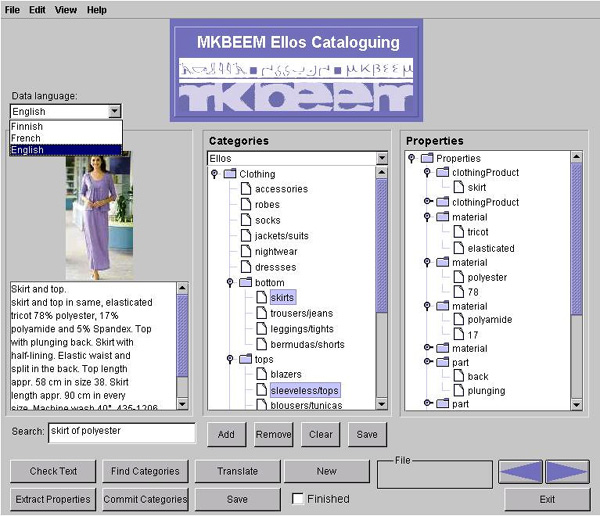
|
|
ERCIM News No.46, July 2001 [contents]
|
by Alain Leger, Aarno Lehtola and Victor Villagra
The MKBEEM project (Multilingual Knowledge Based European Electronic Marketplace) develops a mediation system which adapts the language and the trading conditions of an Internet sales point according to its international customership.
One of the main objectives of a truly user-friendly Information Society is to focus on advanced human language technologies enabling cost-effective interchange across language and culture and more natural interfaces to digital services. Europe is made up from nationalities with a broad variety of cultures and languages. So, the information society must develop in such a way as to support and nurture these rich diversities, rather than act as a constraint to their evolution through the new media.
Mkbeem demonstrates the mediation system with two trials, namely sale of train travels with hotel and other bookings, and B-to-C mail-order sale of clothes and accessories. Figure 1 illustrates the system architecture, which is implemented as Java EJBs. The technical approach is highly based on combined use of human language processing and ontologies. This combination plays a central role in i) mapping the human language query onto an ontological representation; ii) producing composite services from CP catalogues by the broker; iii) mapping ontological queries onto the ontological representations of the catalogues, and iv) describing the domain knowledge. They are used for classifying and indexing catalogues, for facilitating multilingual man-machine dialogues and for inferring information that is relevant to the user’s request.
 |
| Figure 1: Mkbeem system mediates Internet services to international customers. |
Multilingual Cataloguing
Cataloguing concerns maintenance personnel of a content provider in two different roles. First, there are cataloguers, whose duty is to add new products or edit/delete pre-existing products in the mediated repertoire. Secondly, there are catalogue editors, whose role is to maintain the product models, attribute sets and value spaces, market specific product category trees and terminologies. The Mkbeem system implements a multilingual cataloguing scenario for editing, checking and automatic translation of product articles and other product descriptions, for extracting product properties into structured database from textual product articles, for automatically deriving set of possible market-specific categories for a given product, and for processing queries to locate pre-existing product descriptions for maintenance.
The cataloguing uses a human language processing server (HLPS) and a domain ontology server (DOS). HLPS provides language identification, meaning extraction, machine translation, text checking and language generation services. Meaning extraction is a central service that is used for several purposes during cataloguing. It involves executing linguistic analysis on a language input and performing concept matching of the found linguistic constituents with respect to the domain ontology models in order to derive relevant concept bindings. The outcome, the ontologic formula, is represented as a logical clause in the CARIN language and can be used for properties extraction, for finding product categories and for query planning. Figure 2 illustrates the cataloguing UI of a content provider in Mkbeem Pilot 1 system.
 |
| Figure 2: Cataloguing user interface applet of Mkbeem Pilot 1. |
Processing Cross-Lingual Information Requests
Cross-lingual information retrieval is the second key service feature of the MKBEEM service offering. MKBEEM makes use of the combined solution covering both query translation and result translation.
To this purpose, we have based our technical solution on the co-operation between Human Language Processing and Knowledge Representation (conceptual Interlingua reasoning) of the domain of discourse, namely the MKBEEM application domain. Ontologies form a knowledge base for MKBEEM system agents to infer information that is relevant to the user’s dialogues with the MKBEEM system.
From the information retrieval aspect, ontologies improve the accuracy in fuzzy information search. Viewed from a natural language processing perspective, ontologies facilitate mono- and multi-lingual human-computer dialogues by paraphrasing the query of the user through context identification and disambiguation.
Finally, the use of an ontology aims also to solve the cross-language problem as there is not always 1-to-1 correspondence of terms between different cultures. The system should be able to find the same product even if the query is made in a language different from that of the product name / attributes. This possibility should be provided in a way as natural as possible to the user.
Multilingual Trading
The third main functionality foreseen for the MKBEEM system is related to the final step of an e-commerce transaction: the trading. Once a user has chosen his preferred offer provided by the system, he will be able to invoke the trading process in order to acquire the selected good. This implies one or several transactions with the e-commerce platforms of the content providers involved in that offer. As there can be offers that are satisfied by several content providers, the MKBEEM system will act as a one-stop-shopping module able to mediate with the content providers. In this way, the MKBEEM system has to offer the following functionalities:
The Mkbeem project integrates Knowledge Based processing (Knowledge Representation and Reasoning) and Human Language processing in providing multilingual e-commerce mediation services. The consortium aims at proving that the technology concept is robust for given domains, and thereby bringing advances in both technology and services. The consortium consists of the coordinator France Telecom, the user partners Ellos (Finland), SNCF (France) and FIDAL (France), and the R&D partners SEMA (Spain), UPM (Spain), NTUA (Greece), CNRS (France) and VTT.
Link:
Project home page: http://mkbeem.elibel.tm.fr/
Please contact:
Alain Leger — France Telecom R&D, France
Tel: +33 2 99 12 4223
E-mail: Alain.Leger@rd.francetelecom.fr
Aarno Lehtola — VTT Information Technology
Tel: +358 9 456 6032
E-mail: Aarno.Lehtola@vtt.fi
Victor Villagra — Universidad Politécnica de Madrid, Spain
Tel: +34 9154 95700
E-mail: villagra@dit.upm.es